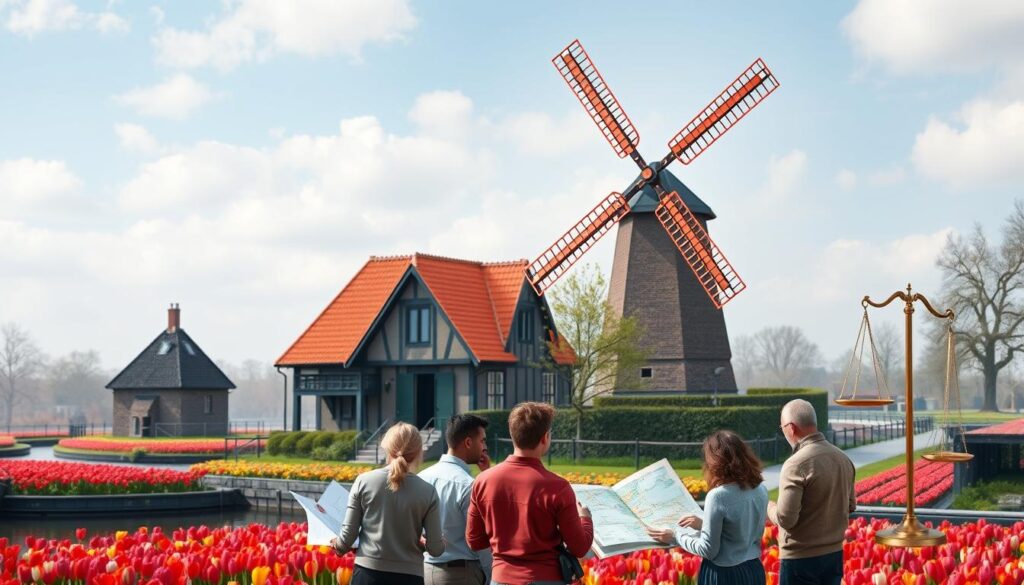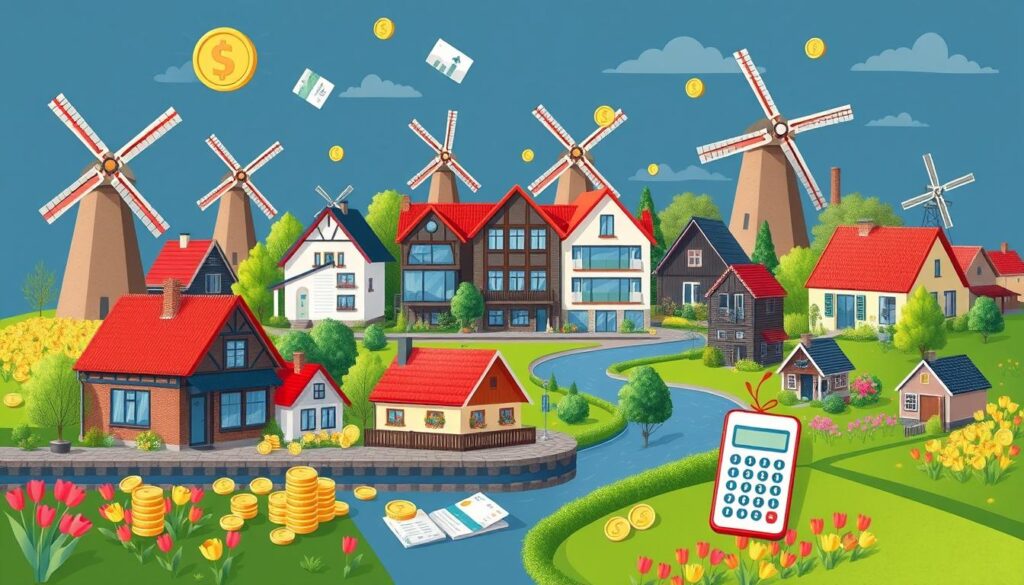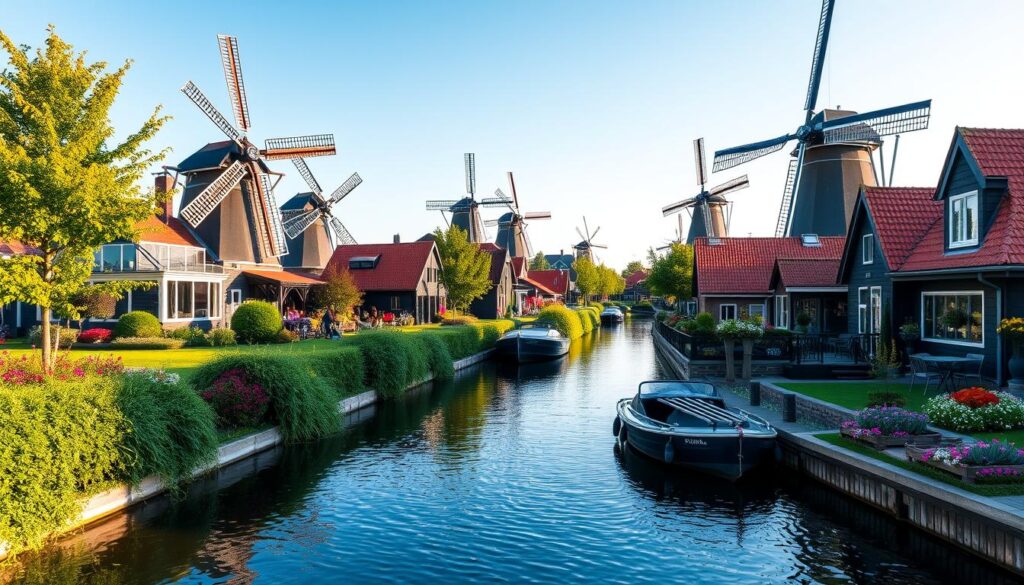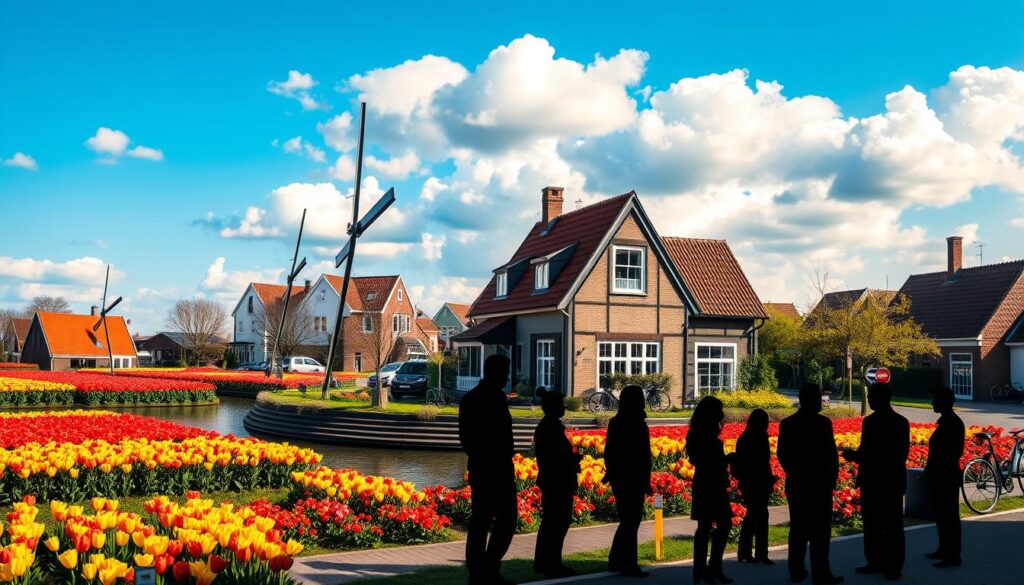Purchasing property as a foreigner in the Netherlands is both an exciting and complex process. Luckily, the Dutch housing market offers a myriad of opportunities for property ownership. Whether you are a resident or a non-resident, the regulations in the Netherlands impose no restrictions on non-Dutch residents buying real estate. This is appealing for investors and expats alike. For those considering homeownership, it is crucial to understand the various facets involved: from obtaining a mortgage to navigating the additional tax considerations.
When it comes to financing, it’s important to note that acquiring a mortgage in the Netherlands typically requires residency and registration. Moreover, while the dream of property ownership for non-Dutch residents is very attainable, the actual process can be laden with several financial and legal nuances. Expats might face unique challenges and costs compared to local buyers, yet the trend of buying real estate in the Netherlands as a non-citizen is becoming increasingly popular as rental prices continue to rise.
Overall, the financial benefits of purchasing property versus renting can be quite evident for those planning to stay long-term. By exploring the Dutch property market and understanding the specifics like varying mortgage rates and property prices, expats can make informed decisions. For detailed guidance and more information, you can visit Expatica’s comprehensive guide on the subject.
Key Takeaways: How to Buy a Property in Netherlands
- The Dutch market allows property ownership for non-resident foreigners.
- Obtaining a mortgage generally necessitates residency and registration in the Netherlands.
- Long-term financial benefits can be seen in buying property over renting.
- Expats must be mindful of added tax considerations and fluctuating property prices.
- Property purchasing processes can be complex but are feasible with proper guidance.
Contact us if you are Interested in Buying Property Abroad!
Overview of Foreign Investment in Dutch Real Estate
Foreign investment in Dutch real estate has seen substantial growth over the years, with prominent investors from the United States, the United Kingdom, and Germany playing a significant role1. This section explores the latest trends, popular Dutch regions for real estate, and how these investments impact the housing market in the Netherlands.
Trends in Foreign Investment
There has been a noticeable increase in investors from emerging markets entering the Dutch real estate sector recently1. The Netherlands’ competitive corporate income tax rate continues to make it an attractive destination for international corporations looking to invest in real estate2. Additionally, fiscal investment institutions (FBIs) in the Netherlands enjoy a zero corporate income tax rate if they meet specific conditions, further appealing to foreign investors1.
Popular Regions for Foreign Buyers
Regions such as Amsterdam, Utrecht, Rotterdam, and The Hague are particularly popular among foreign buyers due to their vibrant economies and appealing living conditions1. Despite the rising property prices, investors are drawn to these areas by the potential for high returns and market stability. Limited partnerships (CV) and funds for joint accounts (FGR) are investment vehicles that provide flexibility and transparency, which are typically favored by foreign entities1.
Impact on the Dutch Property Market
The influx of foreign investment in Dutch real estate has had a considerable impact on the housing market, contributing to rising property prices and shifting market dynamics. The recent increase in the Real Estate Transfer Tax (RETT) from 8% to 10.8% for non-residential properties starting January 1, 2023, reflects an effort to manage the growing investment activity and its effects on the market3. Additionally, the Dutch government has proposed changes to the fiscal regulations affecting FBIs, aiming to restructure real estate investments by high net worth individuals and families3. This legislative shift underscores the significant impact of foreign investment on the Dutch housing market and the need for ongoing regulation.
Legal Requirements for Foreign Buyers in Holland

The legal requirements for foreign buyers in Holland can be navigated smoothly with the right information and preparation. Foreigners can buy real estate in the Netherlands without restrictions, but understanding specific legalities is crucial to ensure a seamless purchase process.
Residency and Visa Requirements
Residency requirements in the Netherlands depend significantly on your citizenship. EU, EEA, and Swiss nationals typically do not need a residence permit to buy property. However, non-EU citizens face stricter criteria, particularly concerning mortgage eligibility. The residency requirements in the Netherlands can affect your options significantly, as Dutch banks may require proof of long-term residency to approve mortgage applications4.
Necessary Documentation for Purchase
Buying property in the Netherlands requires essential documentation, including identification (such as a passport), proof of income, and residency status (if applicable). Financial records and credit history are also scrutinized during the mortgage approval process. It’s worth noting that mortgage applicants can request financing of up to five times their salary, with the maximum mortgage equating to 106% of the purchase price4.
A VAT registration and a tax number are mandatory when buying Dutch property, ensuring compliance with financial regulations. These requirements are part of Dutch property law and are enforced rigorously to prevent financial discrepancies5.
Understanding Dutch Property Law
Dutch property law plays a significant role in how real estate transactions are conducted. Property ownership is registered at the cadastre, a public registry providing transparency and security for both individuals and companies. Notaries in the Netherlands are obligated to adhere to strict regulations, including anti-money laundering laws, ensuring that all transactions are legitimate and above board5.
Additionally, the transfer tax on real estate purchases in the Netherlands is 2% for residential properties6. This tax, along with other associated costs like notary and agent fees, typically sums up to around 10-12% of the purchase price, which buyers should consider when budgeting for their purchase4.
For a more detailed guide on the steps involved in buying a house in the Netherlands, including legal aspects, check out this link.
The Process of Buying Real Estate in the Netherlands as a Non-Citizen
Buying real estate in the Netherlands as a non-citizen involves understanding the distinctive steps and necessary engagement with professionals within the Dutch property market.
Steps from Search to Purchase
The journey begins with searching for suitable properties using online platforms or local agencies. U.S. citizens are not required to have Dutch citizenship, making it easier for them to invest in property here7. Once a desirable property is found, the next steps include making an offer, arranging financing, and signing the purchase agreement. The property purchasing process can be completed remotely, offering significant convenience to non-citizens7. It is also beneficial to open a local bank account to streamline financial transactions related to the purchase7.
Role of Real Estate Agents
The role of Dutch real estate agents cannot be underestimated. They are pivotal in helping non-citizens find properties that align with their requirements and budget. These agents also offer crucial insights into the local market, assist with negotiations, and ensure that all legal documentation is processed correctly. Commonly, an estate agent’s fees in the Netherlands start at a fixed price and later may amount to around 10% of the difference between the asking price and the agreed final price8.
Inspection and Appraisal Processes
A thorough property inspection and appraisal in Holland are critical steps. This ensures the buyer is well-informed about the condition and true value of the property before finalizing the purchase. During this phase, it is standard practice to engage professional inspectors and appraisers who can provide a detailed report on the property’s state. This independent assessment is key to making informed investment decisions. Remember to budget approximately 6% of the purchase price to cover miscellaneous costs such as notary, legal fees, and translator expenses8.
Buying property in the Netherlands involves engaging with reliable real estate agents and conducting comprehensive property appraisals to ensure a successful investment78.
Financing and Mortgages for Foreign Buyers

Securing a mortgage as a foreign buyer in the Netherlands can be both a rewarding and intricate process. Key components include understanding mortgage eligibility criteria, exploring various mortgage options, and employing effective strategies to secure competitive mortgage rates in Holland.
Eligibility Criteria for Mortgages
Foreign buyers in the Netherlands can obtain mortgages under various employment statuses, including temporary, permanent, freelance, or academic positions. To qualify, individuals must provide essential documents such as a passport, proof of income, assets, liabilities, and proof of residency. Given the unique financial landscape for expats, lenders may consider only 90% of income, particularly if it is earned in non-euro currencies mistermortgage.nl/mortgage-requirements-netherlands/9.
Types of Mortgages Available
The most common mortgage types for foreign buyers in the Netherlands are linear and annuity mortgages. These are favored due to their structured repayment schemes and predictability. Dutch banks have expanded their expat mortgage options, facilitating easier access for non-Dutch citizens. Banks may offer financing of up to 85% of the market value for non-residents, with the application process typically taking 4-8 weeks to complete910.
Tips for Securing the Best Rates
Securing competitive mortgage rates in Holland involves several strategic actions. Firstly, it’s advisable to compare rates from multiple lenders. Non-residents should consider the assistance of experienced mortgage advisors, as their insights can significantly ease the process. Additionally, understanding specific mortgage eligibility criteria and addressing any financial obligations beforehand can enhance your chances of getting favorable terms. Keep in mind that lenders generally perceive lower risks with mortgages to expats due to their adherence to financial restrictions in the past910.
Acquiring a mortgage as a foreign buyer is an achievable goal with the right preparation and understanding of the Dutch mortgage landscape. By leveraging available resources and expert advice, securing a mortgage in the Netherlands can be a smooth and successful endeavor.
Advantages and Disadvantages of Buying Property in the Netherlands

Weighing the pros and cons of property ownership in the Netherlands is fundamental for informed decision-making. One of the notable benefits of owning Dutch real estate is the availability of the 30% ruling for expats, which can enhance net salary and facilitate higher mortgage approvals11. Additionally, owning a home in the Netherlands ensures stability in monthly payments as mortgage costs remain steady, unlike rental costs which may increase annually12. Furthermore, property owners do not pay taxes on the profit from increased home values, making it an attractive long-term investment13.
However, there are significant challenges for foreign property buyers in the Netherlands. For instance, the high transaction costs, including notary fees, transfer taxes, and optional costs like mortgage advisor fees and building inspection expenses, can be substantial11. Moreover, maintaining a property involves setting aside funds for repairs and upkeep, which can vary widely from minor fixes to major renovations12. The risk of property value fluctuations also presents a challenge, potentially exposing homeowners to negative equity if values decline12.
Additionally, the rental market restrictions can deter potential buyers who might intend to lease out their property, given that rental increases are common due to inflation or landlord decisions12. Although there are tax benefits associated with property ownership in the Netherlands, understanding these implications is crucial to avoid unexpected financial strains11. For instance, individuals aged 18 to 35 buying a home for up to 440,000 euros are exempt from transfer tax, which can save a significant amount of money13.
In conclusion, while the pros and cons of property ownership in the Netherlands can impact foreign buyers’ decisions, understanding both aspects thoroughly ensures a balanced perspective is maintained. This comprehensive overview serves to highlight the significant considerations for anyone contemplating owning Dutch real estate.
Contact us if you are Interested in Buying Property Abroad!
Cost Considerations When Buying a Home in the Netherlands

Deciding to buy a home in the Netherlands involves many financial considerations beyond just the purchase price. Understanding the full scope of costs, including common fees, taxes, and hidden expenses, is crucial to budgeting effectively and making informed decisions.
Common Fees and Taxes
When buying a property in the Netherlands, there are several standard fees and taxes to consider. Transfer tax is a significant expense, generally around 2% of the property’s purchase price14. Additionally, legal fees, land registry fees, and agent fees collectively represent another 3-6% of the purchase price14. These costs add up, making it imperative to factor them into your overall budget. Furthermore, property tax rates in Amsterdam vary depending on whether the property is residential or commercial and if it is owner-occupied or rented14. Budgeting for these expenses from the outset ensures there are no unpleasant surprises.
Hidden Costs and How to Budget
Beyond the familiar fees and taxes, hidden costs can significantly impact your budget. An essential part of cost considerations in Dutch real estate is the potential expense of renovations and ongoing maintenance, particularly in older buildings which might require extensive work on foundations15. Additionally, costs associated with VvE (Owners’ Association) contributions for building maintenance can vary and should not be overlooked15. Another hidden cost includes interpreter fees for those not fluent in Dutch, typically around 500 Euros14. Thoroughly estimating these expenses will aid in understanding fees and taxes on Dutch property and prevent financial strain post-purchase.
Understanding the Total Cost of Ownership
The total cost of ownership in the Netherlands extends far beyond the initial purchase price. It includes various recurring costs such as property taxes, which are influenced by the property type and its usage14. Even utilities, averaging between 100 and 250 Euros per month, contribute to the ongoing cost14. Home inspections are also vital, as they highlight potential hidden damages that might necessitate further financial outlay16. Buyers should also be prepared for unexpected expenses, like mortgage fees ranging from 800 to 2000 Euros on average14. Understanding and anticipating these elements helps paint a comprehensive picture of the total cost of ownership in the Netherlands.
Can Foreigners buy Real Estate in the Netherlands?

Yes, foreigners can buy real estate in the Netherlands, giving them valuable real estate investment opportunities for non-Dutch citizens. Whether for personal use or as an investment, the accessibility of Holland’s property market has made it an attractive option for non-residents.
Purchasing property in the Netherlands involves several stipulations. Foreigners must meet specific criteria such as residing in the country for at least three years, earning a minimum annual income of €45,000, and holding EU nationality Read more17. These conditions apply to buy-to-let investments, ensuring that the process is both regulated and straightforward.
Financing options are available, but they come with conditions. To secure a mortgage, foreigners can expect banks to cover up to 70% of the property value, and the rest must be financed upfront with cash17. Mortgages in the Netherlands remain attractive due to their generally low interest rates, with some providers offering 100% mortgages18. Consulting a reputable mortgage advisor can help navigate these intricacies, especially for newcomers to the Dutch property market.
For example, major upfront costs when buying a home in the Netherlands can add up to approximately 5–7% of the purchase price if a mortgage is needed, involving a 10% pre-sale deposit, transfer tax, and notary fees among others18. These costs are critical to budget for, as they affect overall affordability.
Potential buyers should be aware of rental restrictions on properties in certain major cities like Amsterdam, where conditions may limit short-term rentals to mitigate vacancy risks17. Additionally, expats can benefit from guidance provided by experts like Expat Mortgages to ensure compliance with all requirements.
The Dutch real estate market has seen steady investments and sharp price rises in cities such as Amsterdam, Utrecht, Rotterdam, and The Hague due to housing shortages18. Population sizes in these cities reflect their status as attractive investment locations: Amsterdam has around 870,000 residents, Rotterdam approximately 650,000, and The Hague around 540,00019. Such demographics make these cities prime for real estate investments.
Ultimately, Holland’s property market access for foreigners remains robust. While there are specific regulations and requirements, the overall process is facilitated by a transparent legal and financial framework, ensuring that investments are both secure and profitable.
Tips for a Successful Property Purchase in the Netherlands

Embarking on the journey of finding property in the Netherlands requires careful planning and utilization of reliable information sources. Implementing the right strategies can greatly enhance your success rate in this competitive market. Let’s dive into some practical tips to ensure a smooth buying process.
Finding the Right Property
Identifying the perfect property starts with leveraging various resources. The Funda website, a prominent housing listing platform, records about 35 million visits monthly20. Expanding your search to other platforms like Jumba and Jaap can reveal more opportunities21. It is also beneficial to categorize your house criteria into ‘must-have’ and ‘nice-to-have’ lists to navigate the competitive housing market in the Netherlands20. Working with an agent can also help as they often have access to off-market properties.
Negotiation Strategies
Effective negotiation tactics are crucial for securing a property at a fair price. In the Dutch housing market, especially in cities like Amsterdam, bidding wars are common20. Engaging in negotiation strategies for Dutch real estate means being prepared to swiftly negotiate within the typical one to three-day window21. It’s important to understand the market value and avoid overbidding. You should also utilize the mandatory three-day cooling-off period to reassess your decision before finalizing any purchase21.
Leveraging Expats’ Resources
Expats can enhance their buying experience by leveraging resources tailored to their unique needs. Platforms such as the City of Amsterdam’s interactive map can provide valuable insights into neighborhood-specific information20. Additionally, seeking advice from independent mortgage brokers like Hanno, who work with over 20 lenders, can help in securing the best mortgage deals with favorable terms22. It is also essential to be aware of the typical insurances required, such as household and home insurance21.
For more detailed guidance on successful property purchase strategies and to avoid common pitfalls, refer to this comprehensive Dutch guide20.
Conclusion
In summary, buying property in the Netherlands as a foreigner involves several significant considerations but remains a feasible and rewarding endeavor. This article has highlighted the trends in foreign investment, legal requirements, the buying process, and financing options available for expat real estate investors. One key point discussed is the buyer’s cost, which generally ranges from 3% to 5% of the property’s purchase price, including various fees and taxes2324. Additionally, non-EU residents may have to meet extra requirements, such as securing a BSN number and showcasing a certain income level23.
The process of purchasing real estate in the Netherlands is thoroughly regulated, with land records fully registered and updated daily, ensuring transparency25. Furthermore, there are no restrictions on property ownership for foreign individuals and entities25. This openness, along with the sophisticated legal and financial systems in place, makes the Dutch real estate market appealing to non-citizens. Final considerations for expat real estate investors include understanding the costs, leveraging local resources like a knowledgeable real estate agent, and opting for the right mortgage product to streamline the buying experience2324.
In the end, with proper due diligence, expert assistance, and a clear understanding of the local market and legalities, investing in Dutch real estate can be a sound and profitable venture. This summary of buying property in the Netherlands underscores the importance of being well-informed and prepared to navigate the unique aspects of the Dutch real estate market.
Contact us if you are Interested in Buying Property Abroad!
FAQ
Can foreigners buy real estate in the Netherlands?
Yes, foreigners can buy real estate in the Netherlands. There are no restrictions on property purchases for foreign residents or non-residents.
What are some current trends in foreign investment in Dutch real estate?
Foreign investment in Dutch real estate is on the rise, with increasing interest in urban areas due to low mortgage interest rates despite the ongoing housing shortages in major cities like Amsterdam and Rotterdam.
Which regions in the Netherlands are popular among foreign buyers?
Popular regions for foreign buyers include major cities such as Amsterdam, Utrecht, Rotterdam, and The Hague. These urban areas are attractive due to their vibrant culture, strong economy, and extensive amenities.
How does foreign investment impact the Dutch property market?
Foreign investment contributes to housing shortages and increases property prices, especially in major cities. However, it also brings economic benefits and enhances the attractiveness of the Dutch real estate market.
What are the legal requirements for foreign buyers in the Netherlands?
Foreign buyers must meet residency and visa requirements. EU, EEA, and Swiss nationals need a residence permit, while non-EU citizens face stricter mortgage eligibility criteria. Necessary documentation includes identification and proof of income.
How do I start the process of buying real estate in the Netherlands as a non-citizen?
Begin by searching for properties, engaging with real estate agents, and conducting property appraisals and inspections. Real estate agents are crucial in identifying suitable properties and negotiating deals on your behalf.
What are the eligibility criteria for obtaining a mortgage as a foreign buyer?
Generally, you must be a resident and registered in the Netherlands to qualify for a mortgage. Additional criteria include proof of income, credit history, and residency status.
What types of mortgages are available in the Netherlands?
Common types of mortgages available are linear and annuity mortgages. These provide different payment structures to suit various financial situations and preferences.
What are the advantages and disadvantages of buying property in the Netherlands?
Advantages include tax incentives, financial stability, and potential long-term savings compared to renting. However, disadvantages are high transaction costs, property maintenance responsibilities, and potential restrictions in the rental market.
What costs should I consider when buying a home in the Netherlands?
Common costs include property taxes, notary fees, and transaction fees. Hidden costs such as renovation, maintenance, and other ownership expenses should also be factored into your budget.
What strategies can help ensure a successful property purchase in the Netherlands?
To maximize success, find the right property by leveraging resources like real estate agents and expat networks. Employ effective negotiation tactics and secure the best mortgage rates with the help of mortgage advisors.
Source Links
- https://www.lexology.com/library/detail.aspx?g=4d205f2d-4ec6-4566-842f-5e582ae0c23b
- https://www.dentons.com/en/services-and-solutions/global-tax-guide-to-doing-business-in/the-netherlands
- https://www.nortonrosefulbright.com/en-nl/knowledge/publications/74f34ccf/the-2024-dutch-tax-plan-impact-on-the-real-estate-sector
- https://lawyersnetherlands.com/purchasing-a-property-in-netherlands-real-estate/
- https://multilaw.com/Multilaw/Multilaw/RealEstate/Real_Estate_Guide_Netherlands.aspx
- https://amsterdamspots.com/how-foreigners-can-buy-property-in-the-netherlands-key-tips/
- https://investropa.com/blogs/news/netherlands-us-citizen-property-ownership
- https://hypodomus-eindhoven.nl/useful-information/
- https://netherlands.bolderlaunch.com/guides/legal-assistance-netherlands/buying-dutch-property-with-foreign-funds/
- https://www.financialconsultancyholland.com/blog/can-you-apply-for-a-mortgage-as-a-non-resident-in-the-netherlands
- https://aankoopmakelaar.amsterdam/buying-house-amsterdam/
- https://www.iamexpat.nl/housing/real-estate-news/should-you-buy-or-rent-home-netherlands
- https://www.iamexpat.nl/housing/real-estate-news/should-you-rent-or-buy-property-netherlands
- https://www.emc2property.co.uk/guides/a-guide-to-buying-property-in-amsterdam-netherlands
- https://www.wanderlustingk.com/travel-blog/expat-buy-home-netherlands
- https://mistermortgage.nl/home-buying-tips-netherlands/
- https://wise.com/us/blog/buying-property-in-europe
- https://www.expatica.com/nl/housing/buying/buying-a-property-in-the-netherlands-100633/
- https://investropa.com/blogs/news/netherlands-real-estate-foreigner
- https://www.peterfabor.com/posts/buying-house-amsterdam
- https://www.hanno.nl/expat-mortgages/buying-a-house-in-the-netherlands/
- https://www.iamsterdam.com/en/live-work-study/living/housing/steps-to-buying-a-house-in-the-netherlands
- https://www.expathousingnetwork.nl/blog/buying-a-home-in-the-netherlands-10-frequently-asked-questions
- https://www.hanno.nl/expat-mortgages/costs-of-buying-a-house-in-the-netherlands/
- https://www.lexology.com/library/detail.aspx?g=8aae40de-9867-4884-99db-aea81f466515

Comments